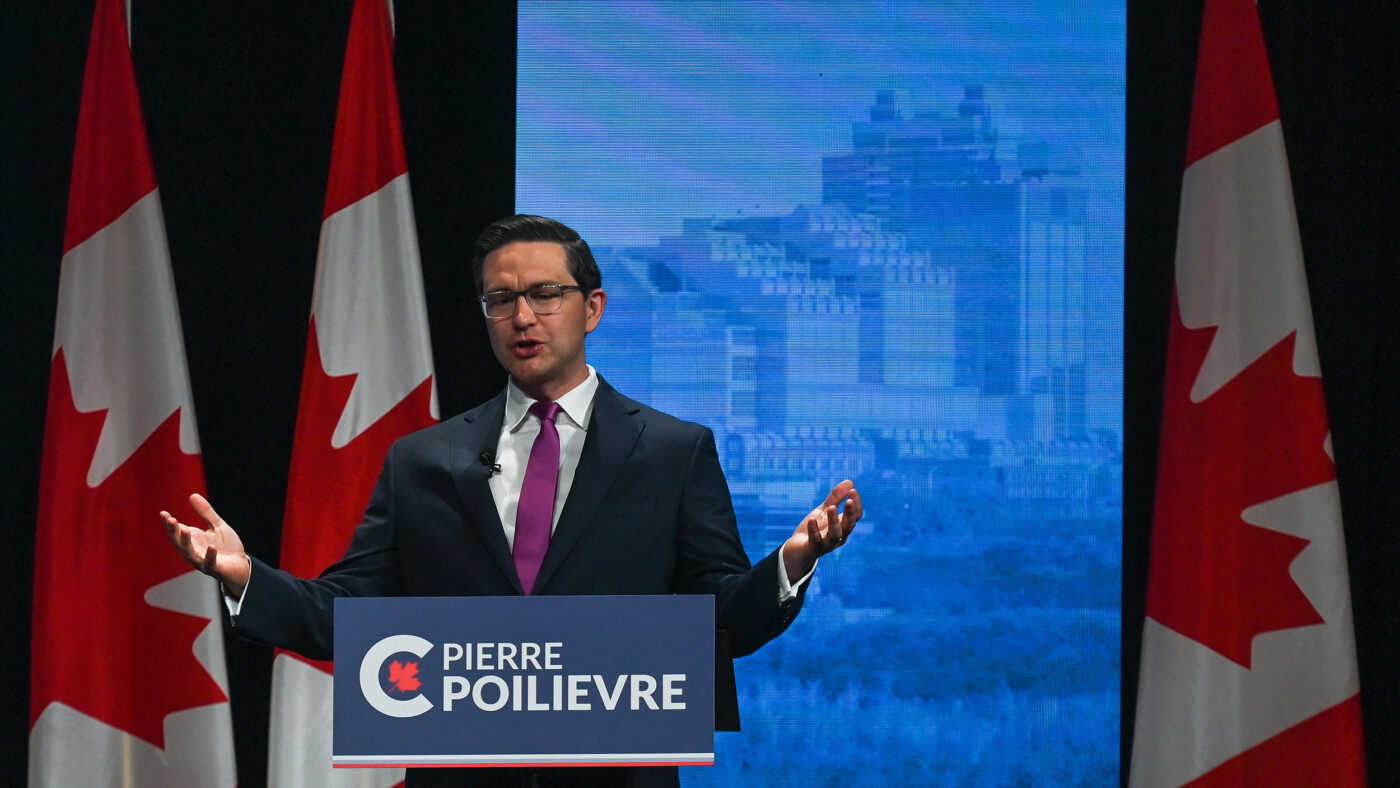While the Tories brace for a Labour landslide at the next general election, the Conservative Party of Canada is soaring ahead in the polls. Nearly 40% of voters in Canada now back the Conservatives. If party leader Pierre Poilievre can sustain this momentum until the next federal election (which could yet be two years away) he will be the next Prime Minister of Canada.
Compare Poilievre’s speech at his recent party conference to and Rishi Sunak’s and it’s easy to see why. Poilievre presented a clear and appealing narrative. He positioned the Conservative Party of Canada as the champion of affordability, promising to tie federal funding in the provinces to the construction of new homes while reducing income tax and scrapping the carbon tax.
In contrast, Sunak used his keynote address at the Conservative Party Conference in Manchester to announce his plans to abort the northern leg of the HS2, ban cigarettes, and follow a more ‘pragmatic’ approach to Net Zero. There was no coherent message linking these announcements, and as a result Sunak failed to inspire conference attendees and the wider public.
The glaring problem to both party members and the opposition was that Sunak ignored the housing crisis in the UK. Labour rightly criticised the Prime Minister for neglecting to mention the increasing unaffordability of housing in this country, the urgent need to build new houses, and the rise in the cost of basic household necessities.
One of the most important issues for voters in both Canada and the UK is the cost of living. Half of young adults in Canada no longer believe they will ever be able to buy a home. Nearly half of all Canadians are now living from paycheque to paycheque, many of them skipping meals as the cost of energy and food continue to rise.
Likewise, in the UK, high rents and mortgage costs are a major component of cost of living pressures. Home ownership among 25 to 34 year olds has plunged from 70% in the 1990s, to less than 40% today. On top of this, around 40% of people in the UK are also buying less food and struggling to make ends meet.
If the Tories are to recover in the polls, they must pay greater attention to the needs of working people. According to a report by James Frayne of Public First for the Centre for Policy Studies (CPS) in September 2022, ‘working-class voters are abandoning the Conservatives as the cost of living crisis bites – and shoring up their support needs to be the party’s overwhelming priority’. While the political context has inevitably changed since the report was published, concerns about the cost of living have only increased.
The Tories have failed to consolidate the coalition of voters that gave them their 80-seat majority in 2019. According to the same report for the CPS, working-class voters made up 40% of the Conservative vote in 2019. A recent poll by YouGov shows that of these working-class voters, only 44% will vote Conservative again.
The Conservative Party of Canada have done exactly what the (CPS) recommended for the Tories in the UK by focusing on the needs of the working class. Poilievre’s mission is to ‘bring it home’, providing Canadians with ‘powerful paycheques that buy affordable food, gas and homes in safe neighbourhoods’. His party’s emphasis on affordability has appealed massively to the working class, as reflected by recent polls that show that Canadians without a university degree are the most likely to vote Conservative.
The clear advantage held by the Conservative Party of Canada is that they are in opposition and therefore not blamed for the cost of living as a governing party would be. The Liberals in Canada, much like the Tories in the UK, bear the brunt of the criticism for the financial (and emotional) tolls of Lockdown.
Yet Labour has swept the rug out from under the Tories’ feet by becoming the party for housing. Keir Starmer made building new homes one of the central themes of his address to the Labour Party Conference earlier this month. His plan to ‘get Britain building’ by ‘bulldozing’ through any unnecessary planning restrictions, as he announced in his conference address, resembles Poilievre’s promises to ‘cut the red tape’ to get more houses built. Labour is moving swiftly to position itself as the party of relief and regeneration, appealing to working people trying to make ends meet – and to young people who want to buy homes and start families.
Housing is a priority for both working-class and millennial voters, the needs of which Tories cannot afford to ignore – as Reem Ibrahim recently argued for CapX. Millennials are now the largest voter base in the country, and only 21% of them would vote Tory. Moreover, polling shows that they are no longer more likely to vote Tory as they age. These younger voters are especially concerned with housing: 29% said that housing was their top concern, compared to 21% of the general population.
The Tories must take a leaf from the Conservative Party of Canada’s book by focusing on the cost of living, especially the housing crisis. Poilievre has answered the increasingly desperate calls of working Canadians for relief from the staggering rise in mortgage and rent prices, and his party has surged ahead in the polls as a result. Sunak would be wise to do the same.
Click here to subscribe to our daily briefing – the best pieces from CapX and across the web.
CapX depends on the generosity of its readers. If you value what we do, please consider making a donation.


